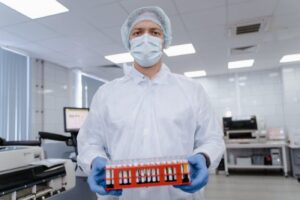
That’s what makes new findings about potentially easier detection compelling and lifesaving. Researchers used blood analysis to detect over 90% of lung cancers in samples from nearly 800 individuals with and without cancer, according to a Johns Hopkins Medicine news release.
The test approach, called DELFI (DNA evaluation of fragments for early interception), uses machine learning to spot unique patterns in the fragmentation of DNA shed from cancer cells circulating in the bloodstream. “When cancer cells die, they release DNA in a chaotic manner into the bloodstream,” says the news release. “DELFI helps identify the presence of cancer using machine learning, a type of artificial intelligence, to examine millions of cell-free DNA fragments for abnormal patterns, including the size and amount of DNA in different genomic regions.”
DELFI helped detect 94% of patients with cancer across stages and subtypes, according to the research, which was detailed in Nature Communications.
Clinical trial under way
The DELFI technology, which requires cost-effective low-coverage genome sequencing, is now being used in a clinical trial of 1,700 U.S. participants, including healthy subjects, lung cancer patients and other cancer patients.
“DNA fragmentation patterns provide a remarkable fingerprint for early detection of cancer that we believe could be the basis of a widely available liquid biopsy test for patients with lung cancer,” says author Rob Scharpf, Ph.D., associate professor of oncology at the Johns Hopkins Kimmel Cancer Center.
“Liquid biopsies” like the DELFI method rely on blood samples, and iSpecimen is deeply involved in supplying specimens of blood and other biofluids to the medical research community. Customers include developers of liquid biopsies, which, as they become available, promise to be easier, more affordable, and more applicable to screening than surgical biopsies.
Through the iSpecimen Marketplace, researchers can obtain whole blood, serum, plasma and buffy coat samples from patients of specific age, gender, race, condition, blood type, BMI, smoking status, medical history, family history, and more. More lung cancer screening could save tens of thousands of lives, and that’s the hope driving a liquid biopsy for lung cancer.
Learn about the iSpecimen Marketplace where you can browse millions of richly annotated, de-identified human tissue and biofluid biospecimens, in addition to hematopoietic and immune cell products and COVID-19 samples. You can join for free.